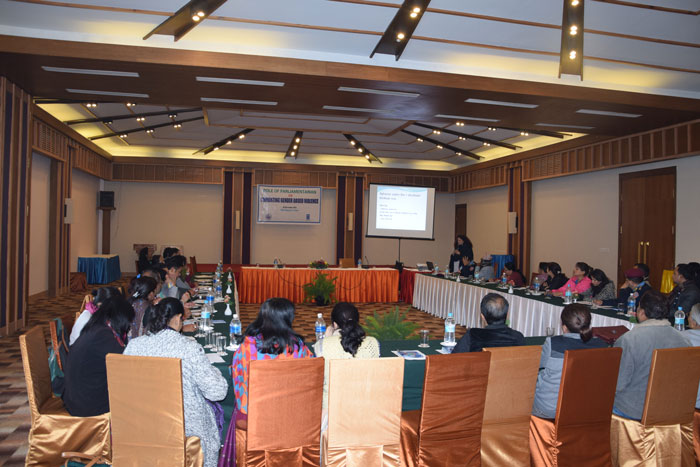
Role of Parliamentarian on combating Gender Based Violence
3rd December 2015
Hotel Himalaya, lalitpur
The program Role of Parliamentarian on combating Gender Based Violence was organized in joint coordination of PSP/UNDP and Media Advocacy Group (MAG) at Hotel Himalaya, in occasion of 16 Days Activism against Gender based Violence which focused its consultation on challenges faced during implementation of combating mechanisms against Gender Based Violence. Concerns and challenges were observed from a total of 50 parliamentarians, civil society experts, media personnel and the Nepal Police. This was one of the very few moments where policy makers, implementers and practitioners came together to discuss such a burning issue which helped the program facilitate smoothly and efficiently. Moreover, the program discussed the oversight functions, potential legislatives for capacity development and possibilities for further strengthening pre-existent regulations.
The program initiated with a brief introduction from Kalpana Sarkar, UNDP representative who highlighted the agenda of UNDP on exterminating gender based issues faced by women and its efforts while constituting women relative agendas on promulgation of the constitution through SPCBN. Additionally, she further added that SPCBN was now reinvigorated as PSP (Parliamentary Support Program) since 8th September which will be working on post constitution promulgation issues.
Ms. Babita Basnet, President of MAG, then continued the program with an informative presentation on Gender Based Violence in Nepal: Role of Policy makers which categorized the issue of GBV into different sections whereby GBV was defined, analyzed from the perspective of different countries, GBV and VAW was differentiated, different Act against GBV were noted, types of GBV were studied, issue of GBV in the constitution and policy maker’s role on implementation of those acts were thus evaluated. However, she also acknowledged the responsibilities of the policy makers in order to implement the preexistent regulations. She added that there should be regulatory mechanisms such as monitoring, implementation mechanisms, appreciation measures and ability to change the leaders who do not obligate to their responsibility which ensures proper functioning of the Acts, policies, regulations and also prevents future dissatisfaction.
AIG Bigyan Sharma, together with SSP Krishna Gautam comprehensively presented on the Appeal against GBV: Challenges and suggestions to investigation, interrogation and Implementation. AIG Sharma insisted all to understand the Police system’s predicaments that they had their own obligations and obstructions in investigative processes. He assured that the police did deal with all the issue in the most legal manner possible; however, he pleaded everyone to understand that the police could not take care of every individual until they ask for help. Nevertheless, SSP Gautam then joined the presentation with an up to date data on the VAW, most infested areas with the cases of VAW, quantitative information on changing trend of violence (Yealy), data on successful investigation, categorization of women within the women mass who are more prone to violence, mechanisms to aware people of VAW, their preventive initiatives and so on. Additionally, he emphasized on the need for awareness mechanisms amongst women and assured police support throughout.
Finally, towards the end of the program, the floor was opened for discussion whereby many parliamentarians showed their support and commitment towards the cause. The program irrefutably addressed issues such as awareness on the Domestic Violence Act from the grassroots, implementation of Cyber Law, address special mechanism for GBV issues post earthquake and also provide some regulatory instruments for issues faced by unmarried couples living together. All the participants echoed positivity, suggestions, and criticality and overall, praised the successful reception and reflected their utmost support from policy making to their collaborative roles.
News
News and Events
Articles Published on Online Portals
৙а•На§∞৲ৌ৮ু৮а•Н১а•На§∞а•Аа§≤а§Ња§И а
Published On:а§Ша§Я৮ৌ а§∞ ৵ড়а§Ъа§Ња§∞
а§∞а§Ња§Ја•На§Яа•На§∞৙১ড় а§Ха§Ња§∞а•На§ѓа§Ња
Published On:а§Ша§Я৮ৌ а§∞ ৵ড়а§Ъа§Ња§∞
а§Єа§Ѓа•Н৐৮а•Н৲৵ড়а§Ъа•На§Ыа•З৶ুৌ а
Published On:а§Ша§Я৮ৌ а§∞ ৵ড়а§Ъа§Ња§∞
women in media
Published On:wow Magazine
‘১а•За§≤ а§≠а§ња§Єа§Њ’ а§≤а§Ња§Ча•На
Published On:а§Ша§Я৮ৌ а§∞ ৵ড়а§Ъа§Ња§∞-৐৐ড়১ৌ а§ђа§Єа•Н৮а•З১